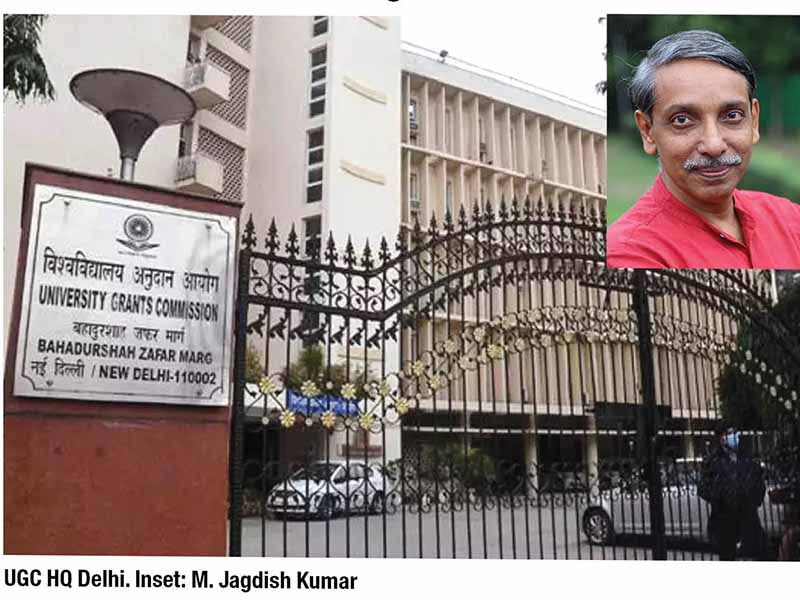Autar Nehru (Delhi)
 Widely believed to be the go-to academic of the RSS, BJP leadership at the Centre, Mamadala Jagdish Kumar, Chairman of the University Grants Committee (UGC), invested with all-important recognition and grants dispensing powers to colleges and universities countrywide, has a penchant for stirring the proverbial hornet’s nest. An alumnus of IIT-Madras and the University of Waterloo, Canada, Jagdish Kumar was a low profile professor of electrical engineering in IIT-Delhi for over a decade until the BJP was swept to power in Delhi in 2014.
Widely believed to be the go-to academic of the RSS, BJP leadership at the Centre, Mamadala Jagdish Kumar, Chairman of the University Grants Committee (UGC), invested with all-important recognition and grants dispensing powers to colleges and universities countrywide, has a penchant for stirring the proverbial hornet’s nest. An alumnus of IIT-Madras and the University of Waterloo, Canada, Jagdish Kumar was a low profile professor of electrical engineering in IIT-Delhi for over a decade until the BJP was swept to power in Delhi in 2014.
Two years later, Jagdish Kumar was plucked from obscurity and appointed Vice Chancellor of the prestigious Jawaharlal Nehru University (JNU), Delhi in 2016, reportedly with the mission to bring Left wing students and faculty who dominated this show-piece postgrad university (estb.1969) to heel. The election of the BJP and especially “fascist” prime minister Narendra Modi was anathema to the powerful JNUSU (Jawaharlal Nehru University Students’ Union), subsidised with rock-bottom tuition-cum-residence fees and spectacularly well-remunerated faculty.
Soon after the BJP government was sworn-in at the Centre, students’ demonstrations and incendiary speeches became normative on JNU’s verdant 1,000-acre campus in the heart of Delhi. Jagdish Kumar’s brief was reportedly to quell the “chaos on the campus” and restore the rule of law.
Following a campus rally on February 2016 called by JNUSU to protest the execution of Afzal Guru, a Kashmiri academic found guilty of terrorism against the state, Kanhaiya Kumar, a Ph D student and president of JNUSU was arrested and charged with sedition. Subsequently, “never hesitant” to call in the police to quell students protests and reportedly encouraging the growth of ABVP — the students wing of BJP — within two years Jagdish Kumar succeeded in restoring equilibrium on the JNU campus, with the past few years being of relative calm.
As a result, at the end of two three-year terms as Vice Chancellor of JNU, ranked among India’s Top 10 universities under the Union education ministry’s NIRF Rankings, Jagdish Kumar was promoted to the UGC corner office in 2022.
Jagdish Kumar’s latest initiative is the draft of a seemingly innocuous circular titled UGC (Minimum Qualifications for Appointment and Promotion of Teachers and Academic Staff in Universities and Colleges and Measures for the Maintenance of Standards in Higher Education) Regulations 2025, released for public consultation on January 6, with a feedback deadline of February 5 (extended to February 28). These guidelines intended to replace a similar document of 2018, have provoked a national uproar and may well create a constitutional crisis with six opposition-ruled states slamming them as “anti-federal” and infringement of the autonomy of state governments.
Under s.10 of the draft, composition of mandatory Search cum Selection Committees (SCSC) to shortlist candidates for appointment of vice chancellors of 520 state universities will be the state Governor appointed by the Centre, a nominee of UGC chairman, and one nominee of the university’s apex body (Senate/Executive Council). This is a major departure from the 2018 guidelines under which SCSCs comprised three-five eminent educationists recommended by state governments (for state government universities) with one of them being a UGC representative. On the recommendation of the SCSC the Governor in his capacity as ex-officio chancellor appoints the selected VC.
Tamil Nadu, Kerala, Telangana, West Bengal, and Karnataka have strongly opposed the new guidelines under which state governments which legislate and fund state universities will have no representation in SCSCs. In effect they have no say in the appointment of VCs with Central government officials (state governor and UGC representative) constituting the majority in SCSCs. “Education must remain in the hands of those chosen by the people, not dictated by Governors acting at the BJP government’s behest,” tweeted Tamil Nadu chief minister M.K. Stalin.
The draft guidelines also contain another controversial provision — selection of eminent non-academics, industry leaders, bureaucrats, and public-sector officials to serve as Vice Chancellors of universities. Traditionally, university VCs have been senior academics with 10 years-plus teaching and/or research experience. With none of India’s universities significantly progressing in respected global ranking league tables, official thinking is that induction of organisation builders and corporate leaders into higher education institutions whose soft underside is perceived to be poor institutional management, will prove a game changer.
Inevitably, academics demur. “Innovation, inclusiveness, community engagement, and institution-building all have their place, but a university must be headed by an academic,” says Dr. Brajesh Kumar Tiwari, associate professor at the Atal Bihar Vajpayee School of Management and Entrepreneurship at JNU, who writes on higher education policy. “Like a professor can’t step into the shoes of a CEO, similarly, an industry leader or bureaucrat can’t do justice to running an academic institution,” he says.
“These reforms of far-reaching consequence require wider and deeper debate in Parliament, academia and society. Lumping them under hasty draft guidelines with a 30-day feedback window is not the way to introduce such deep reforms which have wide implications for the future of higher education in India. Even though some of the proposed reforms have merit, they need to be thoroughly debated before being implemented,” says a professor of education in a top-ranked Delhi undergrad college, speaking on condition of anonymity.
But evidently Mamadala Jagdish Kumar is an academic in a hurry.























